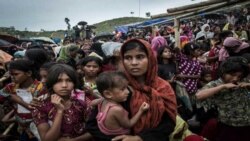News headlines • US pledges $59 million to UN joint response to Rohingya humanitarian crisis • Coronavirus infections spike in China’s central city of Wuhan • Iran’s president says coronavirus has spread to nearly all provinces • Bangladesh orders virus testing for anyone trying to enter country • 11 Myanmar factories close as coronavirus reduces orders, access to raw materials • Turkish parliamentarians brawl after MP criticizes President Erdogan • Biden’s US presidential campaign gains momentum after winning 9 of 14 state primaries Shortwave, 31-meter band 9310 kHz 25-meter band, 11570 kHz, 12030 kHz Report: Mohammed Rukon Uddin (stringer) Topic: Radio listening sessions inform, entertain and educate Rohingya camp dwellers. Translation summary: With limited internet and mobile communications, Rohingyas in Cox’s Bazar settlements hunger for information. Only some households have access to radio. So, the International Organization for Migration (IOM) organizes regular listening sessions in 13 camps it oversees. It draws from the platform Shongjog.com, which collects radio programing from community station Naf, BBC Media Action, Deutsche Welle, Voice of America’s Rohingya-language “Lifeline” and other media. At a Teknaf listening session one Monday in February, senior site management assistant Mohammad Ali said IOM arranges 15 to 20 such sessions every week, delivering news, information and entertainment to Rohingyas and host community neighbors. That day, nearly 100 listeners gathered at a pavilion, sitting on blankets and segregated by gender. They chose three programs for the two-hour session. Afterward, IOM team members guided a group discussion. “We learn many things here: how to take care of children, how to have good relations with neighbors and much more,” said Rehana Begum, a 25-year-old Rohingya who is a regular listener. “Every single show gives us knowledge, and we invite our neighbors, telling of the benefits.” Report: Sabera Begum (stringer) Topic: Two widows in the Thaingkhali camp, near Ukhiya, struggle to survive. Translation summary: Sanura remembers the morning in August 2017 when she lost her husband. He was going to pray at a mosque in Lambaguna, in Rakhine state’s Maungdaw township, but never returned. The military took him captive and later killed him, without disclosing where to find his body. Sanura fled to Bangladesh with their young daughter and her parents. Now 27 and living in the Thaingkhali camp, Sanura is too ill to knit or do anything else to support the household. Rahajan was widowed almost three years ago in Myanmar. She said government people destroyed his shop, and he had a heart attack. Rahajan, her mother and brother later fled to Cox’s Bazar. She said their household of eight struggles to get by on rations provided by government and aid groups. Widows are vulnerable to “poverty, loneliness and isolation,” according to UN Women. But in the rari camp in Balukhali, young widows who lack the protection of husbands turn to each other for support, as Reuters news agency has reported. Donors from Muslim-majority Pakistan gave initial funds for the settlement, and aid groups and individuals continued support.
খন্ড
-
![]() জানুয়ারী ১৬, ২০২৬
জানুয়ারী ১৬, ২০২৬Rohingya Broadcast
-
![]() জানুয়ারী ১৫, ২০২৬
জানুয়ারী ১৫, ২০২৬Rohingya Broadcast
-
![]() জানুয়ারী ১৪, ২০২৬
জানুয়ারী ১৪, ২০২৬Rohingya Broadcast
-
![]() জানুয়ারী ১৩, ২০২৬
জানুয়ারী ১৩, ২০২৬Rohingya Broadcast
-
![]() জানুয়ারী ১২, ২০২৬
জানুয়ারী ১২, ২০২৬Rohingya Broadcast
-
![]() জানুয়ারী ০৯, ২০২৬
জানুয়ারী ০৯, ২০২৬Rohingya Broadcast







